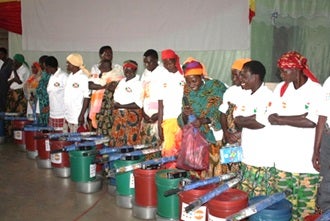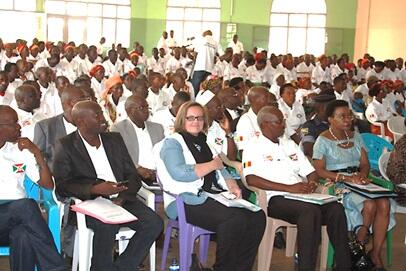Operated and healed of fistula, women bear witness to raise awareness and give hope to those who suffer from this disease
It is on May 23, 2015 that was celebrated in the Ngozi Province the international day to end obstetric fistula in Burundi. This ceremony was enhanced by the presence of Her Excellency Madame Sabine NTAKARUTIMANA, Minister of public health and the fight against AIDS and Madame Suzanne N.MANDONG, Representative of UNFPA in Burundi.
The National Programme of Reproductive Health (PNSR), with the support of UNFPA, marked this day under the theme "end fistula, restore the dignity of women." This celebration was marked by live testimonies of women who have been operated from fistula. Most of them were accompanied by their husbands, who understood the importance of supporting their wives if they are suffering from this disease.
The National Programme of Reproductive Health (PNSR), with the support of UNFPA, marked this day under the theme "end fistula, restore the dignity of women." This celebration was marked by live testimonies of women who have been operated from fistula. Most of them were accompanied by their husbands, who understood the importance of supporting their wives if they are suffering from this disease.
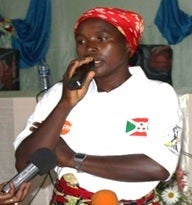
Pulchérie MUGWANEZA, one of the women who been have healed of fistula, was in Ngozi for the ceremonies. With her husband and her two-month-baby, they had to attend this special day where exchanges with other families were prioritized. Pulchérie had a story to tell that moved those who were present: "I started to have the urine flowing without me being able to holding them", told her, tears flowing down his cheeks. . "... After a difficult labor of my first child; health providers gave me antibiotics recommending me to return home and that it would gradually disappear. After a few days, these constant vaginal discharges became smelly and unbearable. When I would walked for a long time, it would be as if someone has put pepper on me. I was ashamed of myself. My husband could not bear it. He left me for a while, arguing that he was going to search for work elsewhere. Fortunately, he quickly understood and returned home. He contacted the health center, which referred me to the Centre of repair of fistula in Gitega. I was then operated successfully; I went with tips including sexual abstinence for 6 months. To cure this evil, the support of the spouse, family, friends and the community is important because complete healing is not only based on the surgical treatment. It's also a psychosocial support, and I think that's is the most important. I thank God that rewarded me by giving me this child after 2 others had died. »
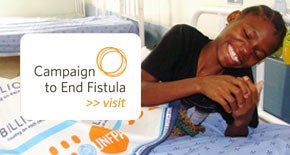
Telling the story of how he lived the situation of his wife when she was suffering fistula, Pulchérie's husband acknowledged that it is not always easy to understand what is happening, given that this disease is not much known. After the surgery undergone by his wife, Pulchérie's husband thought: "My God, how difficult will it be to abstain from sex for 6 months! I thought that after the operation, everything would return to normal immediately. It was only after been to the doctor for further explanation that I understood. It was for my wife." For husbands, "it is essential to try to understand the suffering endured to then support women suffering from obstetric fistula".
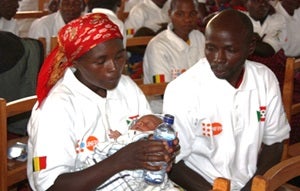
Pulchérie and her husband have completed their poignant testimony urging UNFPA and other partners to strengthen the support and support to women suffering from this disease.
The projection of a film, the testimonies of health providers and community organizers helped guests understand the importance to make screening and surgery fistula. Women who were operated took the opportunity to organize themselves into a platform for exchanging experiences and ideas from their social reintegration. Free exchanges among participants including the different programs managers at the Ministry of public health and the fight against AIDS have marked this day.
It was noted that progress has been made but that many women especially the poorest and the vulnerable, still lack access to sexual and reproductive health services and quality reproduction, including emergency obstetric care, life-saving. Indeed, in Burundi, according to the national survey of estimate of the prevalence of obstetric fistula by 2013, the prevalence of this infirmity is 3550 case with an incidence of 750 new cases per year.
It was noted that progress has been made but that many women especially the poorest and the vulnerable, still lack access to sexual and reproductive health services and quality reproduction, including emergency obstetric care, life-saving. Indeed, in Burundi, according to the national survey of estimate of the prevalence of obstetric fistula by 2013, the prevalence of this infirmity is 3550 case with an incidence of 750 new cases per year.
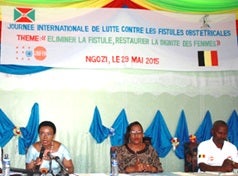
Mrs Suzanne MANDONG, Representative of UNFPA delivered, on this occasion, a statement, which focused on the message of the Executive Director of UNFPA for the international day to end obstetric fistula: "progress has been made but many women, especially the poor and vulnerable, still lack access to sexual and reproductive services, especially to emergency obstetric care and life-saving drugs. These women are marginalized, deprived of any right and have no voice. »
The day was closed by the delivery of the kits to 150 women operated and healed of obstetric fistula. Each kit consisted of a loincloth, 4 pans, a tee shirt, 6 soaps, a box of 500 g of ointment for the body, a bucket, 5 reusable napkins, a radio and an umbrella. "We are very happy and we thank UNFPA for the very useful gifts in our daily life of women. This day gave us the opportunity to share our experiences and stories. "With our husbands, we are determined to bring other women still hiding to light because this disease is curable"; this is the message left by 117 women operated and healed of fistula , who had come for a public celebration".
